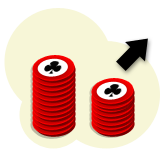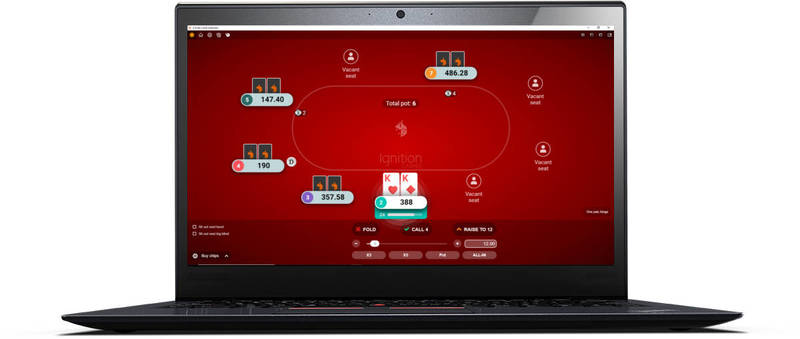Small Blind Strategy
Blind leakage is an exceptional video by James 'SplitSuit' Sweeney that covers everything you need to know about profitable blind play (both in the SB and BB) in Texas Hold'em cash games.

The small blind is a very tricky position to play from in Texas Hold'em. If you were to track your performance in each position at the table using a program such as Poker Tracker, you will find that the small blind is a losing position overall.
The best players in the world find it difficult to win money from the small blind, and that's just the way it is.
When playing in the small blind our aim is to try and reduce the amount of money we will lose, so that we can increase our overall wins from the other seats at the table.
The problem with playing in the small blind.
The fundamental reason as to why the small blind is such a difficult and losing position in the hand is due to the fact that we are going to be first to act in every round after the flop. Being out of position means that our opponents will get to see how we act before they do, giving them more information on the strength of our hand than we have on theirs.
This will put us at a big disadvantage throughout the hand, as any experienced player knows how important a role that position plays in poker, especially in Texas Holdem.
Therefore we should know that when playing from the small blind, we are going to be on an uphill struggle throughout the hand. So a good small blind strategy would to not embark on this struggle in the first place, and simply fold before the flop. If we do intend to get involved when in the small blind, we will want to have a very strong starting hand to compensate for the fact that we are going to be out of position for every round after the flop.
Using starting hand selection to save money in the small blind.
By using solid starting hand selection we can increase our chances of winning the hand despite the fact that we are out of position. Even though the small blind may be a losing seat overall, it does not mean that we will lose money on every individual hand that we play from that particular position. So don’t be afraid to enter a pot if you have a strong enough hand to do so, but always remember to tighten your starting hand requirements when in the small blind.
A common small blind strategy mistake.
A big mistake when playing in the small blind is being under the notion that its worth seeing a flop for a little extra, as half of your blind is already in the pot. However, whilst having half of your blind in the pot does improve the pot odds you have to call, there is the possibility that you are setting yourself up for bigger losses than you might expect.
The extra half a bet that you have to call to see a flop may look innocent, but in real fact it is a very dangerous play, especially for the less experienced players. The big losses do not lie in the extra half a bet lost on every flop that we miss, but in the hands where we have half a holding, and put more money in the pot than necessary to try and find out if we are ahead.
Never feel committed to a pot simply because you have paid your blind. It is not profitable to try and protect money you have put in the pot through the blinds, so play the hand like any other.
Playing in the small blind example.
Let say we are in the small blind and there have been a few limpers before us. We look down and see that were are holding K![]() 7
7![]() . This looks like a half decent hand and so we decide to call because it’s only half a blind more to see a flop.
. This looks like a half decent hand and so we decide to call because it’s only half a blind more to see a flop.
The flop comes down 9![]() T
T![]() K
K![]() giving us top pair with a 7 kicker, not a bad hand.
giving us top pair with a 7 kicker, not a bad hand.
Having top pair we decide to bet out around ¾ of the pot to see how the other players react. A few players fold, but an opponent in one of the later positions raises us 3 times our original bet, and the action is now back onto us.
In this situation our opponent could have a range of hands; they could have a king with a worse kicker, or a king with a better kicker. They may have two pair, a set, or even a straight or a flush draw. There are so many possibilities and we have little information on which hand he could have because we are out of position. But seeing as we have a half decent hand we decide to call.
The turn makes the board 2![]() , which doesn't improve our hand and probably made little difference to our opponent's.
, which doesn't improve our hand and probably made little difference to our opponent's.
Because we are a little unsure about the strength of our hand we decide to check, and our opponent then comes out with a pot-size bet. Now we are still unsure if our opponent does have a better hand, or whether he is just exploiting our weakness because we checked. However, by this time a pot-size bet is quite large, so we decide to let the hand go and cut our losses.
Small blind example evaluation.
When reading through the hand above you probably recognized the situation all too well. Having a half decent hand but coming up against strength from another opponent and being out of position is all too common.
These situations are difficult to play because we have so little information on our opponents and we can never be sure if we do have the best hand. In the hand mentioned above, this problem could have easily been avoided by folding pre-flop, saving us a decent amount of money in the process.
The poor position in this hand has caused us a lot of problems, and it always will when you are playing from the small blind.
Although K![]() 7
7![]() looks like a reasonable hand, it just proves to be the type of hand that is going to cause us problems after the flop if we hit any part of it. So if we are determined to enter a pot when calling from the small blind, we have to play cards that have potential to hit a very big hand.
looks like a reasonable hand, it just proves to be the type of hand that is going to cause us problems after the flop if we hit any part of it. So if we are determined to enter a pot when calling from the small blind, we have to play cards that have potential to hit a very big hand.
By sticking with cards like suited connectors and pocket pairs, we will either hit a big hand or we wont, which saves us the trouble of deciding what to do after the flop. A marginal hand is the last thing we want to hit when out of position, so don’t try and put up a battle with them and be prepared to let them go when you come up against action.
Small blind strategy evaluation.
The small blind is a very tricky position to play from, so we should try and avoid entering too many pots from this position unless we have a premium hand. Calling from the small blind will usually cause more problems than it is worth, so try and avoid doing so unless you have a hand that has some potential.
The small blind is the worst position to be in, so don’t expect too much from the hand because you are always going to be at a disadvantage to ourself money in the long run if you folded every marginal hand instead of calling.
Related articles.
Go back to the awesome Texas Hold'em Strategy.
Comments

